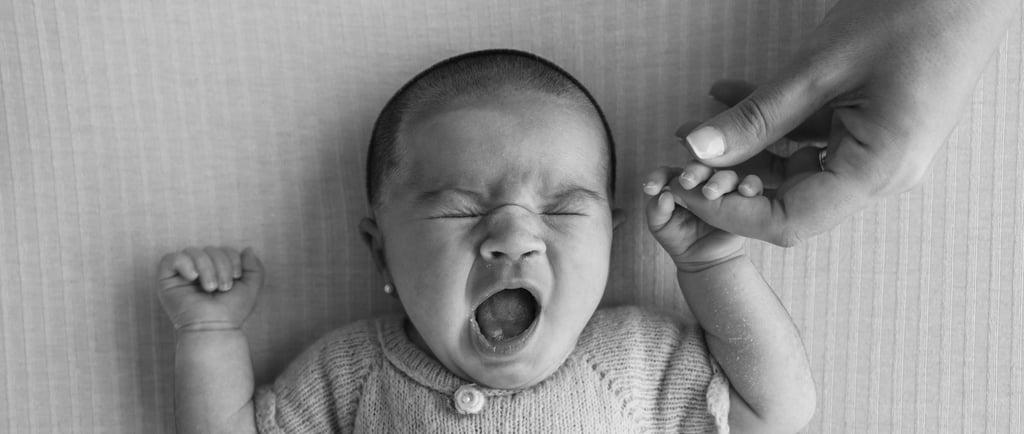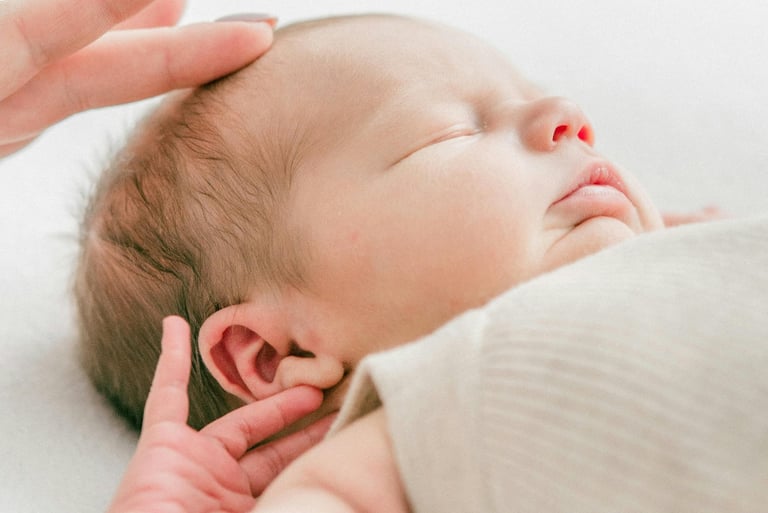Are Good Sleepers Born or Made?
Is biology or behaviour the cause of your baby's wakings?
Rachael Reedman
9/24/20256 min read


Conversations around baby sleep start right from the beginning. You announce you are pregnant, and so many people with well-meaning advice start telling you how bad sleep is, or start bombarding you with information on how to get good sleep from the beginning. Then your baby arrives, and one of the first things people ask about is how well they sleep. You head off to your baby groups and the comparisons start - “My baby is a terrible sleeper” or “my baby slept through from 7 weeks”. This can leave you feeling either like you are not alone or that you are doing something wrong.
“How’s the Sleep Going?”
The Question Every New Parent Gets Asked.
So what makes a ‘good sleeper’?
Are some babies just born this way, or is it something we can nurture?. Let’s look at the difference between biology and behaviour when it comes to baby sleep.


The Biology of Baby Sleep
Babies are born with immature sleep systems
Newborn babies are born with immature sleep systems. Although they are exposed to their mother’s hormonal regulation when in the womb (Mark et. al., 2017), they do not start producing their own melatonin until approximately 12 weeks of age. Melatonin is a hormone produced in the body that causes a sensation of sleepiness. It is what drives us to sleep and it increases as darkness falls and decreases in the early hours in preparation for waking for the day. Without it, the drive to sleep is much less.
Their circadian rhythm develops gradually
Often parents think that babies have confused their days and nights but in actual fact, it is more of the case that their body clock doesn’t function in the same way (yet) as older babies and toddlers. Using blackout blinds at this stage is likely to have no impact on daytime sleep due to not producing melatonin. Instead, your goal here is to help your baby’s body clock regulate, so exposing them to daylight in the daytime and darkness at nighttime is more beneficial.
You are likely to have heard of the 4 month sleep regression. This is a period of time where sleep undergoes a key, permanent change and babies start to have sleep cycles that more closely resemble those of older children and babies. This includes more phases of sleep and it is when transitioning through these and into the next sleep cycles that more sleep disruption can occur. It is a temporary disturbance and not one to be feared (unlike 100s of claims on social media!). If you have good sleep practices in place, it can pass you relatively easily, but for some it can be a struggle. It is in actual a significant progression in terms of sleep biology and will lead to better, deeper, more consolidated stretches of sleep.
Temperament plays a key part
The temperament of your baby plays a key part in what sleep is like for them. Some babies are much easier to calm and are generally more placid. Others are FOMO babies, always on the go and keen to make their demands known. (Bruni, O) Either way, temperament is not something you can change, but finding sleep approaches that matches your baby’s individual personality is key.
Frequent waking is biological and an inbuilt safety device
Waking during the night is a normal part of sleep. Everyone does it, babies, toddlers, children and adults. Our bodies are programmed to do this - you just don’t know about it. In newborns, frequent waking is necessary for development and is protective against SIDS (NCT). Newborn babies have tiny tummies and therefore need frequent feeds to sustain them. This should be offered on demand. Frequent wakes also helps to prevent babies from falling into too deep a sleep, which can be a factor in SIDS.
Some older babies (4mo+) are able to then fall back to sleep unaided. We can call these the self-settlers. However, it is very common for babies, the ‘signalers’ to need support to fall back to sleep. This is where the behaviour side comes in.
Melatonin is produced in our bodies, is our drive to sleep.
Sleep regression or progression?
The Behavioural Side of Sleep
How babies fall asleep often shapes how they stay asleep.
Feeding, rocking and cuddling to sleep are all completely natural ways to help your baby drift off and there is nothing wrong with doing this. What is important to remember is that whatever you do to get your baby to sleep, is what they will seek for every wakeup.
Promoting independent associations such as, white noise, swaddling (if age appropriate), dummies, blacked out room etc can aid in helping your little one to go back to sleep more independently.
Sleep is a skill - and like all skills, it can be supported and guided
Yes, the drive to sleep is biological, but how we fall asleep is behavioural and therefore can be shaped and guided. Using a settling technique that aligns with your baby’s temperament and your parenting style can teach your little one how to fall asleep more independently.
A sleep schedule that works
Building a sleep schedule that reflects your baby’s individual sleep needs and is realistic, will link sleep biology to the behavioural side of sleep. Trying to get a baby to sleep who is simply not tired, is never going to get you the results you want. This tends to end in short naps, and frequent night wakings. Conversely, keeping a baby awake far too long, leads to heightened emotions, overtriedness, and can result in an alteration in sleep phases. Sometimes just adjusting schedules by 15-20 minutes can make all the difference.
A sleep environment that promotes sleep
Optimising the sleep environment will make it more conducive to good sleep. A blacked-out room, white noise on constantly, swaddle/sleepsack, an appropriate and safe sleep space, and a safe temperature are all things that you can keep consistent. Add to this a clear and consistent bedtime routine, and your baby will know that sleep is coming.
Sleep associations are a primary reason for bedtime difficulties (Midell, A 2023)
Baby sleep is not linea.
So this means, even those gifted with the most amazing sleepers, will also have their own sleep struggles at times. This can be due to illness, teething, growth spurts and key times of development. What can remain consistent is how you respond to these wakings.


What Parents Can Do
✔ Use multi-sensory sleep cues to avoid creating a primary one.
✔ Optimise the sleep space for safety and relaxation.
✔ Set realistic expectations for your baby’s age and development.
✔ Tune into your baby’s temperament and respond with a technique that will support them.
✔ Create a calming and consistent bedtime routine as an early sleep cue.
✔ Consider your baby’s sleep schedule. You want sleep pressure to be high to support your baby in falling asleep and staying asleep for longer.
Above all else, remind yourself that night wakings are normal and that you are doing your best for your baby.
If your baby doesn’t sleep through the night yet, it doesn’t mean they’re a “bad sleeper.” It means they’re human. With time, gentle guidance, and realistic expectations, sleep can improve — for everyone in the family.
Want help turning sleep struggles into smoother nights? I use sleep science and realistic expectations to guide families to better rest.
Final Thoughts


I’m Rachael Reedman, the founder and owner of Somnium Infant Sleep Consultancy. As a paediatric sleep consultant, I help families achieve better rest using sleep science and realistic expectations. With over 17 years of experience in child development and early years education — and as a mum of three myself — I understand how overwhelming sleep struggles can be.
My philosophy is simple: sleep isn’t about being perfect — it’s about helping your baby (and you) find the rest you need to thrive.
© 2025 Somnium Infant Sleep – All rights reserved.
Restful nights and brighter days
© 2024. All rights reserved.
